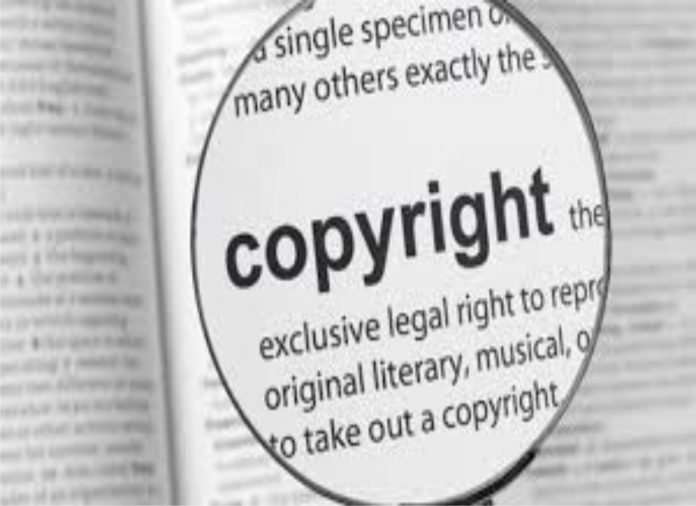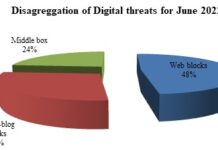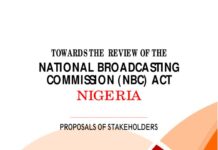The following sections of the copyright law as stipulated in the constitution of the Federal Republic of Nigeria are directly related to the media practices in Nigeria:
PART I
Copyright
SECTION
- Works eligible for copyright.
- Copyright by virtue of nationality or domicile.
- Copyright by reference to country of origin.
- Copyright in works of Government, State authorities and International bodies.
- Copyright by reference to international agreements.
- General nature of copyright.
- Nature of copyright in sound recording.
- Nature of copyright in broadcast.
- Broadcasting of works incorporated in cinematograph film.
- First ownership of copyright.
- Assignment and Licence.
- Right to claim authorship.
- Right to share in proceeds of sale.
- Duty of printer, etc., to keep register.
- Infringement of copyright.
- Action for infringement.
- Limitation to the right of action.
- Conversion rights.
- Infringement actionable as breach of statutory duty.
- Criminal Liability.
- Anti-piracy measures.
- Offence by bodies corporate.
- Penalties for making false entries.
- Civil and Criminal actions may be simultaneous.
- Order for inspection and seizure.
PART II
Neighboring Rights
- Performer’s right.
- Duration of performer’s right.
- Infringement of performer’s right.
- Infringement of a performer’s right actionable.
- Criminal Liability in respect of infringement of performer’s right.
- Protection of expressions of folklore.
- Infringement of folklore.
- Criminal Liability in respect of infringement of folklore
[Commencement.]
PART I
Copyright
- Works eligible for copyright
(1) Subject to this section, the following shall be eligible for copyright-
(a) Literary works;
(b) Musical works;
(c) Artistic works;
(d) Cinematograph films;
(e) Sound recordings; and
(f) Broadcasts.
(2) A literary, musical or artistic work shall not be eligible for copyright unless-
(a) Sufficient effort has been expended on making the work to give it an original character;
(b) The work has been fixed in any definite medium of expression now known or later to be developed, from which it can be perceived, reproduced or otherwise communicated either directly or with the aid of any machine or device.
(3) An artistic work shall not be eligible for copyright if, at the time when the work is made, it is intended by the author to be used as a model or pattern to be multiplied by any industrial process.
(4) A work shall not be ineligible for copyright by reason only that the making of the work or the doing of any act in relation to the work involved an infringement of copyright in some other work.
- Copyright by virtue of nationality or domicile
(1) Copyright shall be conferred by this section on every work eligible for copyright of which the author or, in
the case of a work of joint authorship, any of the authors is at the time when the work is made, a qualified person, that is to say-
(i) An individual who is a citizen of, or is domiciled in Nigeria; or
(ii) A body corporate incorporated by or under the laws of Nigeria.
(2) The term of copyright conferred by this section shall be calculated according to the table set out in the First Schedule to this Act.
[First Schedule.]
(3) In the case of anonymous or pseudonymous literary, musical or artistic works, the copyright therein shall subsist until the end of the expiration of seventy years from the end of the year in which the work was first published: Provided that, when the author becomes known, the term of copyright shall be calculated in accordance with paragraph 1 of the First Schedule to this Act.
(4) In the case of a work of joint authorship, a reference in the First Schedule to this Act to the death of the
author shall be taken to refer to the author who dies last, whether or not he is a qualified person within subsection (1) of this section.
- Copyright by reference to country of origin
(1) Copyright shall be conferred by this section on every work, other than a broadcast, which is eligible for copyright and which-
(a) Being a literary, musical or artistic work or a cinematograph film, is first published in Nigeria; or
(b) Being a sound recording is made in Nigeria, and which has not been the subject of copyright conferred by section 2 of this Act.
(2) Copyright conferred on a work by this section shall have the same duration as is provided by section 2 of this Act in relation to the same type of work.
- in works of Government, State authorities and International bodies
(1) Copyright shall be conferred by this section on every work which is eligible for copyright and is made by or under the direction or control of the Government, a State authority or a prescribed International body.
(2) The term of copyright conferred by this section shall be calculated in accordance with the table set out in the First Schedule to this Act.
[First Schedule.]
- Copyright by reference to international agreements
(1) Copyright shall be conferred by this section on every work if-
(a) On the date of its first publication at least one of the authors is-
(i) A citizen of or domiciled in; or
(ii) A body corporate established by or under the laws of, a country that is a party to an obligation in a treaty or other international agreement to which Nigeria is a party;
(b) The work is first published-
(i) In a country which is a party to an obligation in a treaty or other international agreement to which
Nigeria is party;
(ii) By the United Nations or any of its specialised agencies; or
(iii) By the Organisation of African Unity; or
(iv) By the Economic Community of West African States.
[1999 No. 42.]
(2) Where the question arises as to whether a country is a party to an obligation in a treaty or other international agreement to which Nigeria is also a party, a certificate from the Commission to that effect shall be conclusive proof of that fact.
- General nature of copyright
(1) Subject to the exceptions specified in the Second Schedule to this Act, copyright in a work shall be the exclusive right to control the doing in Nigeria of any of the following acts, that is-
[Second Schedule.]
(a) In the case of a literary or musical work, to do and authorise the doing of any of the following acts-
(i) Reproduce the work in any material form;
(ii) Publish the work;
(iii) Perform the work in public;
(iv) Produce, reproduce, perform or publish any translation of the work;
(v) Make any cinematograph film or a record in respect of the work;
(vi) Distribute to the public, for commercial purposes, copies of the work, by way of rental, lease, hire, loan or similar arrangement;
(vii) Broadcast or communicate the work to the public by a loudspeaker or any other similar device;
(viii) Make any adaptation of the work;
(ix) Do in relation to a translation or an adaptation of the work, any of the acts specified in relation to the work in sub-paragraphs (i) to (vii) of this paragraph;
(b) In the case of an artistic work, to do or authorise the doing of any of the following acts, that is-
(i) Reproduce the work in any material form;
(ii) Publish the work;
(iii) Include the work in any cinematograph film;
(iv) Make any adaptation of the work;
(v) Do, in relation to an adaptation of the work, any of the acts specified in relation to the work in subparagraphs
(i) To (iii) of this paragraph;
(c) In the case of cinematograph film, to do or authorise the doing of any of the following acts, that is-
(i) make a copy of the film;
(ii) Cause the film, in so far as it consists of visual images, to be seen in public and, in so far
as it consists of sounds, to be heard in public;
(iii) Make any record embodying the recording in any part of the soundtrack associated with the film by utilising such soundtrack;
(iv) Distribute to the public, for commercial purposes, copies of the work, by way of rental, lease, hire, loan or similar arrangement.
(2) The doing of any of the acts referred to in subsection (1) of this section shall be in respect of the whole or a substantial part of the work either in its original form or in any form recognisably derived from the original.
(3) Copyright in a work of architecture shall also include the exclusive right to control the erection of any building which reproduces the whole or a substantial part of the work either in its original form or any form recognizably derived from the original, but not the right to control the reconstruction in the same style as the original of a building to which the copyright relates.
(4) The provisions of the Third Schedule to this Act shall apply to musical works.
[1992 No. 98.Third Schedule.]
- Nature of copyright in sound recording
(1) Copyright in a sound recording shall be the exclusive right to control in Nigeria-
(a) The direct or indirect reproduction, broadcasting or communication to the public of the whole or a substantial part of the recording either in its original form or in any form recognisably derived from the original;
(b) The distribution to the public, for commercial purposes, of copies of the work by way of rental, lease, hire, loan or similar arrangement.
(2) The exceptions specified in paragraphs (a), (h), (k), (I) and (p) of the Second Schedule to this Act shall apply to the copyright in sound recording in like manner as they apply to copyright in literary, musical or artistic work or a cinematograph film.
- Nature of copyright in broadcast
(1) Subject to this section, copyright in a broadcast shall be the exclusive right to control the doing in Nigeria of any of the following acts, that is-
(a) The recording and the re-broadcasting of the whole or a substantial part of the broadcast;
(b) The communication to the public of the whole or a substantial part of a television broadcast, either in its original form or in any form recognisably derived from the original; and
(c) The distribution to the public, for commercial purposes, of copies of the work, by way of rental, lease, hire, loan or similar arrangement.
(2) The copyright in a television broadcast shall include the right to control the taking of still photographs from the broadcast.
(3) The exceptions specified in paragraphs (a), (h), (k), (n) and (o) of the Second Schedule to this Act shall apply to the copyright in a broadcast, in like manner as they apply to copyright in literary, musical or artistic work or a cinematograph film.
[1992 No. 98.Second Schedule.]
- Broadcasting of works incorporated in cinematograph film
(1) Where the owner of the copyright in any literary, musical or artistic work authorises a person to incorporate the work in a cinematograph film and a broadcasting authority broadcasts the film, the owner of the copyright shall, in the absence of any express agreement to the contrary between the owner and that person, be deemed to have authorised the broadcast.
(2) Notwithstanding subsection (1) of this section, where a broadcasting authority broadcasts a cinematograph film in which a musical work is incorporated, the owner of the right to broadcast the musical work shall, subject to this Act, be entitled to receive fair compensation from the broadcasting authority.
(3) In the absence of an agreement on or relating to the compensation payable under subsection (2) of this section, the amount of compensation shall be determined by the court.
- First ownership of copyright
(1) Copyright conferred by sections 2 and 3 of this Act, shall vest initially in the author. (2) Notwithstanding subsection (6) of section 11 of this Act where a work-
(a) Is commissioned by a person who is not the author’s employer under a contract of service or apprenticeship; or
(b) Not having been so commissioned, is made in the course of the author’s employment, the copyright shall belong in the first instance to the author, unless otherwise stipulated in writing under the contract.
(3) Where a literary, artistic or musical work is made by the author in the course of his employment by the proprietor of a newspaper, magazine or similar periodical under a contract of service or apprenticeship as is so made for
the purpose of publication in a newspaper, magazine or similar periodical, the said proprietor shall, in the absence of any agreement to the contrary, be the first owner of copyright in the work in so far as the copyright relates to the publication of the work in any newspaper, magazine or similar periodical; or to the reproduction of the work for the purpose of its being so published; but in all other respects, the author shall be the first owner of the copyright in the work.
(4) In the case of a cinematograph film or sound recording the author shall be obliged to conclude, prior to the making of the work, contracts in writing with all those whose works are to be used in the making of the work.
(5) Copyright conferred by section 4 of this Act shall vest initially in the Government on behalf of the Federal Republic of Nigeria, in the State authority on behalf of the State in question, or in the international body in question, as the case may be, and not in the author.
- Assignment and Licence
(1) Subject to the provisions of this section, copyright shall be transmissible by assignment, by testamentary disposition or by operation of law, as movable property.
(2) An assignment or testamentary disposition of copyright may be limited so as to apply to only some of the
acts which the owner of the copyright has the exclusive right to control, or to a part only of the period of the copyright, or to a specified country or other geographical area.
[1999 No. 42.]
(3) No assignment of copyright and no exclusive licence to do an act, the doing of which is controlled by copyright, shall have effect unless it is in writing.
(4) A non-exclusive licence to do an act, the doing of which is controlled by copyright, may be written or oral, or may be inferred from conduct.
(5) An assignment or licence granted by one copyright owner shall have effect as if granted by his co-owner also, and, subject to any contract between them, fees received by the grantors shall be divided equitably between all the co-owners.
(6) For the purposes of this subsection, persons shall be deemed to be co-owners-
(a) If they share a joint interest in the whole or any part of a copyright; or
(b) If they have interest in the various copyrights in a composite production, that is to say, a production consisting of two or more works.
(7) An assignment, licence or testamentary disposition may be effectively granted or made in respect of a
Future work or an existing work in which copyright does not yet subsist; and the prospective copyright in any such work shall be transmissible by operation of law as movable property.
(8) A testamentary disposition of material on which a work is first written or otherwise recorded shall, in the absence of any contrary indication, be presumed to include any copyright or prospective copyright in the work which is vested in the deceased.
- Right to claim authorship
The author of a work in which copyright subsists has the right-
[1992 No. 98. 1999 No. 42.]
(a) To claim authorship of his work, in particular, that his authorship be indicated in connection with any of the acts referred to in section 6 of this Act except when the work is included incidentally or accidentally when reporting current events by means of broadcasting;
(b) To object and to seek relief in connection with any distortion, mutilation or other modification of and any other derogatory action in relation to his work, where such action would be or is prejudicial to his honour or reputation.
(2) The rights referred to in subsection (1) of this section, are perpetual, inalienable and imprescriptible.
(3) For the purpose of this section, “author” includes his heirs and successors in title.
- Right to share in proceeds of sale
(1) Notwithstanding any assignment or sale of the original work, the authors of graphic works, three dimensional works and manuscripts shall have an inalienable right to a share in the proceeds of any sale of that work or manuscript by public auction or through a dealer whatever the method used by the latter to carry out the operation.
(2) The right conferred by this section shall apply to originals of such work.
(3) The conditions for the exercise of the right conferred by this section shall be determined by regulations to be made by the Nigerian Copyright Commission established under section 34 of this Act.
[1992 No. 98. 1999 No. 42.]
(4) The foregoing provisions of this section shall not apply to architectural works or applied art.
(5) In this section, “author” includes heirs and successors in title.
- Duty of printer, etc., to keep register Publishers, printers, producers or manufacturers of works in which copyright subsists shall keep a register of all works produced by them showing the following, that is-
(a) The name of the author;
(b) The title;
(c) Year of production; and
(d) The quantity of the work produced.
- Infringement of copyright
(1) Copyright is infringed by any person who without the licence or authorisation of the owner of the copyright-
(a) Does, or causes any other person to do an act, the doing of which is controlled by copyright;
(b) Imports or causes to be imported into Nigeria any copy of a work which, if it had been made in
Nigeria would be an infringing copy under this section of this Act;
[1992 No. 98.]
(c) Exhibits in public any article in respect of which copyright is infringed under paragraph (a) of this subsection;
(d) Distributes by way of trade, offers for sale, hire or otherwise or for any purpose prejudicial to the owner of the copyright, any article in respect of which copyright is infringed under paragraph
(a) Of this subsection;
(e) Makes or has in his possession plates, master tapes, machines, equipment or contrivances used for the purpose of making infringed copies of the work;
(f) Permits a place of public entertainment or of business to be used for a performance in the public of the work, where the performance constitutes an infringement of the copyright in the work, unless the person permitting the place to be so used was not aware, and had no reasonable ground for suspecting that the performance would be an infringement of the copyright;
(g) Performs or causes to be performed, for the purposes of trade or business or as supporting facility to a trade or business, any work in which copyright subsists.
(2) Notwithstanding subsection (1) of this section, or any other provision of this Act, where any work in which copyright subsists, or a reproduction of any such works, is comprised in-
(a) The archives stored in the National Archives established under the National Archives Act; or
[Cap. N6.]
(b) The public records of a State, being records for the storage or custody of which provision is made by law, the copyright in the work is not infringed by the making or the supplying to any person of any reproduction of the work in pursuance of that Act or law.
- Action for infringement
(1) Subject to this Act, infringement of copyright shall be actionable at the suit of the owner, assignee or an exclusive licensee of the copyright, as the case may be, in the Federal High Court exercising jurisdiction in the place where the infringement occurred; and in any action for such an infringement, all such relief by way of damages, injunction, accounts or otherwise shall be available to the plaintiff as is available in any corresponding proceedings in respect of infringement of other proprietary rights.
(2) Where an action for infringement of copyright brought by the copyright owner or an exclusive licensee relates to an infringement in respect of which they have concurrent rights of action, the copyright owner or the exclusive licensee may not, without the leave of court, proceed with the action unless the other is either joined as a plaintiff or added as a defendant.
(3) Where, in an action for infringement of copyright, it is proved or admitted that an infringement was committed but that at the time of the infringement the defendant was not aware and had no reasonable grounds for suspecting that copyright subsisted in the work to which the action relates, the plaintiff shall not be entitled under this section to any damages against the defendant in respect of the infringement, but shall be entitled to an account of profits in respect of the infringement, whether or not any other relief is granted under this section.
(4) Where, in an action under this section, an infringement of copyright is proved or admitted, and the court in which the action is brought, having regard (apart from all other material considerations) to-
(a) The flagrancy of the infringement; and
(b) Any benefit shown to have accrued to the defendant by reason of the infringement, is satisfied that effective relief would not otherwise be available to the plaintiff, the court, in assessing damages for the infringement, shall have power to award such additional damages by virtue of this subsection as the court may consider appropriate in the circumstances.
(5) No injunction shall be issued in proceedings for infringement of copyright which requires a completed or partly completed building to be demolished or prevents the completion of a partly completed building.
(6) In this section, “action” includes a counterclaim, and references to the plaintiff and to the defendant in an action shall be construed accordingly.
- Limitation to the right of action
Notwithstanding the provisions of this Act or any other law, no action for the infringement of copyright or any right under this Act shall be commenced or maintained by any person-
(a) Carrying on the business of negotiating and granting of licences;
(b) Collecting and distributing royalties in respect of copyright works or representing more than fifty owners of copyright in any category of works protected by this Act, unless it is approved under section 39 of this Act to operate as a collecting society or is otherwise issued with a certificate of exemption by the Commission.
[1999 No. 42.]
- Conversion rights
All infringing copies of any work in which copyright subsists, or of any substantial part thereof, and all plates, master tapes, machines, equipment or contrivances used, or intended to be used for the production of such infringing copies, shall be deemed to be the property of the owner, assignee or exclusive licensee, as the case may be, of the copyright, who accordingly may take proceedings for the recovery of the possession thereof or in respect of the conversion thereof.
- Infringement actionable as breach of statutory duty
(1) An infringement of the rights conferred by sections 10 and 12 of this Act is actionable as a breach of statutory duty owed to the person entitled to the right.
[1992 No.98.]
(2) In proceedings for infringement of the rights conferred by the said sections 10 and 12 of this Act, the person whose rights have been infringed shall be entitled to an award of damages, injunction and any other remedies as the court may deem fit to award in the circumstances.
- Criminal Liability
(1) Any person who-
(a) Makes or causes to be made for sale, hire, or for the purposes of trade or business any infringing copy of a work in which copyright subsists; or
(b) Imports or causes to be imported into Nigeria a copy of any work which if it had been made in Nigeria would be an infringing copy; or
[1992 No. 98. 1999 No.42.]
(c) Makes, causes to be made, or has in his possession, any plate, master tape, machine, equipment or contrivance for the purposes of making any infringing copy of any such work, is, unless he proves to the satisfaction of the court that he did not know and had no reason to believe that any such copy was an infringing copy of any such work, or that such plate, master tape, machine, equipment or contrivance was not for the purpose of making infringing copies of any such work, guilty of an offence under this Act and liable on conviction to a fine of an amount not exceeding N1,000 for every copy dealt with in contravention of this section or to a term of imprisonment not exceeding five years, or to both such fine and imprisonment.
[1992 No.98. 1999 No. 42.]
(2) Any person who-
(a) Sells or lets for hire or for the purposes of trade or business, exposes or offers for sale or hires any infringing copy of any work in which copyright subsists; or
[1992 No.98.]
(b) Distributes for the purposes of trade or business any infringing copy of any such work; or
(c) has in his possession, other than for his private or domestic use, any infringing copy of any such work; or
(d) Has in his possession, sells, lets for hire or distribution for the purposes of trade or business, or exposes or offers for sale or hire any copy of a work which, if it had been made in Nigeria, would be an infringing copy.
[1992 No.98.] is, unless he proves to the satisfaction of the court that he did not know and had no reason to believe that any such copy was an infringing copy of any such work, guilty of an offence under this Act and liable on conviction to a fine ofN100 for every copy dealt with in contravention of this section, or to a term of imprisonment not exceeding two years or, in the case of an individual, to both such fine and imprisonment.
(3) Any person who, without the consent of the owner, distributes, in public for commercial purposes, copies of a work in which copyright subsists by virtue of sections 6 (1) (a) (vi), 6 (1) (c) (iv), 7 (1) (b) or 8 (1) (c) of this Act, by way of rental, lease, hire, loan or similar arrangement, is guilty of an offence under this Act, and liable upon conviction to a fine ofN100 for every copy dealt with or imprisonment for six months or to both such fine and imprisonment.
[1992 No.98.]
(4) The court before which any proceedings are taken for any offence under subsections (1), (2) and (3) of this section, whether the alleged offender is convicted or not, may order all copies of the works, plates master tapes, machines, equipment and contrivances in the possession of the alleged offender, which appear to be infringing copies of the works, to be destroyed or delivered up to the owner of the copyright or otherwise dealt with as the court may think fit.
(5) Where an article has been seized by a police officer or an authorised officer in connection with a suspected offence under this Act, a court may on the application of the Attorney-General of the Federation or owner of the copyright in connection with which such offence is suspected to have been committed, order that the article be destroyed or delivered up to the owner of the copyright or otherwise dealt with as the court may think fit, notwithstanding that no person has been charged with the suspected offence.
- Anti-piracy measures
(1) The Commission shall have power, with the consent of the Minister, to prescribe any design, label, mark, impression or any other anti-piracy device for use on, in or in connection with any work in which copyright subsists.
[1999 No.42.]
(2) Any person who-
(a) Sells, rents, hires; or
(b) offers for sale, rent or hire, any work in contravention of the prescription made pursuant to subsection (1) of this section, commits an offence and is
liable on conviction to a fine not exceeding N100,000or imprisonment for a term not exceeding 12 months or to both such fine and imprisonment.
[1999 No.42.]
(3) Any person who without the permission of the Commission-
(a) Imports into Nigeria; or
(b) Has in his possession, any anti-piracy device prescribed under this section or any machine, instrument or other contrivance intended for use in the production of the anti-piracy device, is guilty of an offence and is liable on conviction to a fine not exceeding N500,000 or imprisonment for a term not exceeding five years, or to both such fine and imprisonment.
[1999 No.42.]
(4) A person who without the permission of the Commission-
(a) Is in possession of; or
(b) Reproduces; or
(c) Counterfeits,
Any anti-piracy device prescribed under this section, is guilty of an offence and is liable on conviction to a fine not exceeding N50,000 or imprisonment to a term not exceeding five years, or to both such fine and imprisonment.
[1999 No. 42.]
(5) The Commission shall have power, with the consent of the Minister, to make regulations specifying the conditions necessary to give effect to the purpose of this section.
[1999 No. 42.]
- Offence by bodies corporate
(1) Where an offence under this Act has been committed by a body corporate, the body corporate and every person who at the time the offence was committed was in charge of, or was responsible to the body corporate for the conduct of the business of the body corporate shall be deemed to be guilty of such offence and liable to be proceeded against and punished accordingly: Provided that, nothing contained in this subsection shall render any person liable to any punishment, if he proves that the offence was committed without his knowledge or that he exercised all due diligence to prevent the commission of such offence.
(2) Notwithstanding anything contained in subsection (1) of this section, where an offence under this Act has been committed by a body corporate and it is proved that the offence was committed with the consent or connivance of any director, manager, secretary or other officer of the body corporate, such director, manager, secretary or other officer shall also be deemed to be guilty of that offence and shall be liable to be proceeded against and punished accordingly.
(3) For the purposes of this section-
“Body corporate” includes a firm or other association of persons; and
“Director” in relation to a firm includes a partner in the firm.
- Penalties for making false entries
Any person who-
(a) Fails to keep a register required under section 14 of this Act; or
(b) Makes or causes to be made a false entry in such register; or
(c) Produces or tenders, or causes to be produced or tendered as evidence any such entry or writing, knowing the same to be false, is guilty of an offence under this section and liable on conviction to a fine not exceeding N10,000.
- Civil and Criminal actions may be simultaneous
Notwithstanding the provisions of any law to the contrary, it shall be permissible for both criminal and civil actions to be taken simultaneously in respect of the same infringement under this Act.
- Order for inspection and seizure
(1) In any action for infringement of any right under this Act, where an ex parte application is made to the court supported by affidavit, that there is reasonable cause for suspecting that there is in any house or premises any infringing copy or any plate, film or contrivance used or intended to be used for making infringing copies or capable of being used for the purposes of making copies or any other article, book or document by means of or in relation to which any infringement under this Act has been committed, the court may issue an order upon such terms as it deems just,
authorising the applicant to enter the house or premises at any reasonable time by day or night accompanied by a police officer not below the rank of an Assistant Superintendent of Police, and-
(a) Seize, detain and preserve any such infringing copy or contrivance; and
(b) Inspect all or any documents in the custody or under the control of the defendant relating to the action.
(2) Any person who knowingly gives false information under this section of this Act, is guilty of an offence and liable on conviction to a fine of N1,000.
PART II
Neighboring Rights
(1) A performer shall have the exclusive right to control, in relation to his performance, the following acts-
(a) Performing;
(b) Recording;
(c) Broadcasting live;
(d) Reproducing in any material form; and
(e) Adaptation of the performance.
(2) In this section, “performance” includes-
(a) A dramatic performance (which includes dance and mime);
(b) A musical performance; and
(c) A reading or recitation of literary act or any similar presentation which is or so far as it is, a live performance given by one or more individuals.
- Duration of performer’s right
The right conferred by section 26 of this Act shall subsist in relation to the performance until the end of the period of fifty years from the end of the year in which the performance first took place.
- Infringement of performer’s right
A performer’s right is infringed by a person who, without the performer’s consent or authorisation in writing, does any of the following, that is-
- Makes a recording of the whole or substantial part of a live performance:
Provided that, where the consent sought is to make a recording of the work for research, private or domestic use, such consent shall not be unreasonably refused;
(b) Broadcasts live, or includes live in a cable programme, the whole or a substantial part of the live performance;
(c) performs in public the whole or a substantial part of the performance;
(d) Shows or plays in public the whole or a substantial part of the performance for commercial purposes;
(e) Broadcasts, or includes in a cable programme, a substantial part of the performance by means of recording which is, and which that person knows or has reason to believe was made, without the performer’s consent;
(f) Imports into the country otherwise than for his private or domestic use, a recording of a performer’s work which is an infringing recording; or
(g) In the course of trade or business, sells or lets for hire, offers, distributes or displays for sale or hire,
a recording of a performer’s work which is an infringing recording.
- Infringement of a performer’s right actionable
(1) An infringement of a right protected under section 26 of this Act shall be actionable by the person entitled to the right as a breach of statutory duty and the performer shall be entitled to damages, injunction, account for profit or conversion.
(2) Where a person has in his possession, custody or control, in the course of trade or business or otherwise than for a private or domestic use, an unauthorised recording of a performance, a person having the performer’s right or recording rights in relation to the performance under this section shall be entitled to an order of the court that the recording be forfeited and delivered up to him.
- Criminal Liability in respect of infringement of performer’s right
(1) Notwithstanding the provisions of section 28 of this Act, a person who does any of the acts set out in the said section 28 shall, unless he proves to the satisfaction of the court that he did not know that his conduct was an infringement of the performer’s right, be liable on conviction-
(a) In the case of an individual, to a fine not exceeding N10,000;
(b) In the case of a body corporate, to a fine of N50,000;
(c) In all other cases, to a fine of N100 for each copy dealt with in contravention or to imprisonment for twelve months or to both such fine and imprisonment.
(2) A court before which an offence under this section is tried shall order that the recording or any other part thereof be delivered to the performer.
- Protection of expressions of folklore
(1) Expressions of folklore are protected against-
(a) Reproduction;
(b) Communication to the public by performance, broadcasting, distribution by cable or other means;
(c) Adaptations, translations and other transformations, when such expressions are made either for commercial purposes or outside their traditional or customary context.
(2) The right conferred in subsection (1) of this section shall not include the right to control-
(a) the doing of any of the acts by way of fair dealing for private and domestic use, subject to the condition that, if the use is public, it shall be accompanied by an acknowledgement of the title of the work and its source;
(b) The utilisation for purposes of education;
(c) Utilisation by way of illustration in an original work of an author: Provided that, the extent of such utilisation is compatible with fair practice;
(d) The borrowing of expressions of folklore for creating an original work of an author: Provided that, the extent of such utilisation is compatible with fair practice;
(e) The incidental utilisation of expressions of folklore.
(3) In all printed publications and in connection with any communications to the public, of any identifiable expression of folklore, its source shall be indicated in an appropriable manner, and in conformity with fair practice, by mentioning the community or place from where the expression utilised has been derived.
(4) The right to authorise acts referred to in subsection (1) of this section shall vest in the Nigerian Copyright Commission.
(5) For the purpose of this section, “folklore” means a group-oriented and tradition-based creation of groups or individuals reflecting the expectation of the community as an adequate expression of its cultural and social identity, its standards and values as transmitted orally, by imitation or by other means including-
(a) Folklore, folk poetry, and folk riddles;
(b) Folk songs and instrumental folk music;
(c) Folk dances and folk plays;
(d) Productions of folk arts in particular, drawings, paintings, carvings, sculptures, pottery, terracotta,
mosaic, woodwork, metal ware, jewelry, handicrafts, costumes, and indigenous textiles.
- Infringement of folklore
Any person who, without the consent of the Nigerian Copyright Commission, uses an expression of folklore in a manner not permitted by section 31 of this Act, shall be in breach of statutory duty and be liable to the Commission in damages, injunctions and any other remedies as the court may deem fit to award in the circumstances.
- Criminal Liability in respect of infringement of folklore
(1) A person who-
(a) does any of the acts set out in section 31 of this Act without the consent or authorisation of the
Commission; or
(b) Does not comply with the requirement in subsection (4) of section 31 of this Act; or
(c) Willfully misrepresents the source of an expression of folklore; or
(d) Willfully distorts an expression of folklore in a manner prejudicial to the honour, dignity or cultural interests of the community in which it originates;
(e) Is guilty of an offence under this Act.
[1999 No. 42.]
(2) A person convicted of an offence under subsection (1) of this section is liable on conviction-
(a) In the case of an individual, to a fine not exceeding N100,000 or to imprisonment for a term of 12 months or to both such fine and imprisonment; and
(b) In the case of a body corporate, to a fine of N500,000
[1999 No.42.]
(3) A court before which an offence under this section is tried may order that the infringing or offending article be delivered to the Commission.
[1999 No.42.]
PART III
Administration of Copyright
- Establishment of the Nigerian Copyright Commission
(1) There is hereby established a body to be known as the Nigerian Copyright Commission (in this Act referred to as “the Commission”).
[1999 No.42.]
(2) The Commission shall be a body corporate with perpetual succession and a common seal and may sue and be sued in its corporate name.
(3) The Commission shall-
(a) Be responsible for all matters affecting copyright in Nigeria as provided for in this Act;
(b) Monitor and supervise Nigeria’s position in relation to international conventions and advise
Government thereon;
(c) Advise and regulate conditions for the conclusion of bilateral and multilateral agreements between
Nigeria and any other country;
(d) Enlighten and inform the public on matters relating to copyright;
(e) Maintain an effective data bank on authors and their works;
(f) Be responsible for such other matters as relate to copyright in Nigeria as the Minister may, from time to time, direct.
- Establishment, Membership and Functions of the Governing Board
(1) The Commission shall have a Governing Board (in this Act referred to as “the Board”) which shall consists of the following members-
(a) A Chairman to be a person knowledgeable in copyright matters, to be appointed by the
President on the recommendation of the Minister;
(b) The Director-General of the Commission;
(c) One representative of the Federal Ministry Justice;
(d) One representative of the Federal Ministry of Education;
(e) A representative of the Nigeria Police Force, not below the rank of a Commissioner of Police;
(f) One representative of the Nigerian Customs Service, not below the rank of a Comptroller of Customs;
(g) Six other persons to be appointed by the Minister who shall represent as far as possible the authors in the following areas-
(i) Literary works;
(ii) Artistic works;
(iii) Musical works;
(iv) Cinematograph films;
(v) Sound recordings; and
(vi) Broadcasts.
















